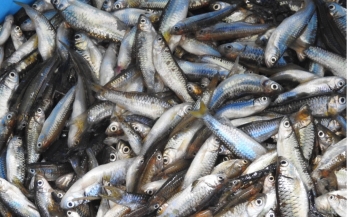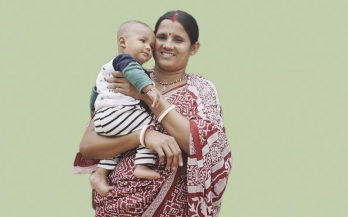

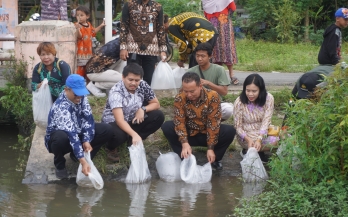
A New Small Fish Restocking Model Projects 20x Production Improvement in Indonesia
As an archipelagic nation, Indonesia ranks third globally in fisheries and aquaculture production. Despite these abundant, nutrient-rich aquatic resources, the country still faces significant malnutrition challenges stemming from insufficient intake of protein, micronutrients, and essential fatty acids. In 2021, the average per capita fish consumption in Indonesia reached 25.33 kg, notably lower than Malaysia (52.7 kg), a nation with fewer resources (KKP, World Population Review). This disparity highlights the gap between resources availability and dietary outcomes.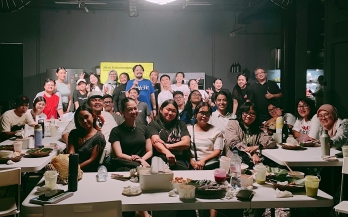
Shaping Food Culture Together: Lessons from Jakarta’s Walking Tour
Jakarta moves fast. So do its appetites. Over the past five years, Indonesia’s food landscape has shifted further towards convenience and high-risk options, moving away from diets that are nourishing and environmentally grounded. Indonesia Health Survey 2023 tells the story in numbers: high-fat foods consumption rose from 58.5% in 2018 to 60.7% in 2023; salty foods jumped from 40.3% to 52.2%; and instant noodles climbed from 45% to 51.7%. Meanwhile, adequate vegetable intake (five portions per day) fell from 4.6% to 3.3%.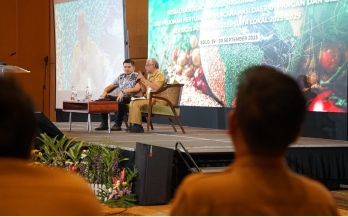
Four Pathways for Climate – Nutrition integration in Indonesian policies
Why Climate and Nutrition Integration Matters? Climate change is not just an environmental issue; it intersects with systemic multiple aspects of human life. It interlinks the Sustainable Development Goals (SDGs) which aim to end hunger and poverty, preserve the environment, and ensure prosperity. In practice, climate change worsens hunger and hidden hunger as its increasing disasters, declining agricultural harvest and productivity, and threatening crop nutrition.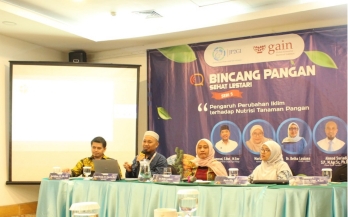
Climate Change Does Not Only Threaten Food Production But Also Crop Nutrition
On October 14, 2025, the 5th series of Bincang Pangan Sehat Lestari brought together experts, policymakers, and practitioners from government agencies and NGOs. The discussions focused on the impact of climate change on food crop nutrition.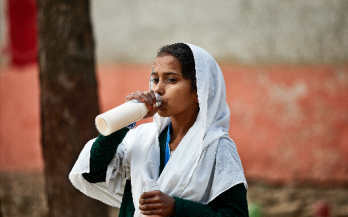
Harnessing Youth Potential For Transforming Pakistan’s Food Systems
- 22/10/2025
As Pakistan advances its URAAN Plan and National Food Systems Transformation Pathway, meaningful youth engagement will determine how inclusive that progress becomes. Despite strong national frameworks and growing youth-led innovation, young people remain largely outside formal decision-making. This policy brief sets out practical actions to institutionalise youth participation across governance structures—embedding the Scaling Up Nutrition Youth Network (SYN) within national and provincial coordination bodies, assigning youth advisory roles and quotas, and establishing a Youth in Food Systems Working Group to align mandates and financing. It further calls for building leadership pipelines through a Youth Food Policy Fellowship, integrating national programmes like Kamyab Jawan with food system priorities, and introducing digital accountability tools such as a Youth Engagement Scorecard. By embedding youth as architects of transformation, Pakistan can turn its demographic strength into a lasting engine for innovation, accountability, and resilient food systems.
GAIN Working Paper n°58: INDONESIAN FOOD CULTURE OVERVIEW OF INDONESIAN FOOD CULTURE DIMENSIONS AND STRATEGIES FOR SHIFTING PREFERENCES
- 02/10/2025
Food culture refers to a shared value system, norms, symbols, and perceptions. Yet within the food and nutrition sector, it is often reduced to traditional foods, dishes, or cuisines—a narrow view that constrains how food culture could be leveraged to shape future food preferences and habits. This working paper reviews Indonesian food culture broadly, seeking to understand and appreciate the country’s diverse cuisine. The paper draws on data from governmental reports, academic papers, media reports, social media analysis, and expert interviews.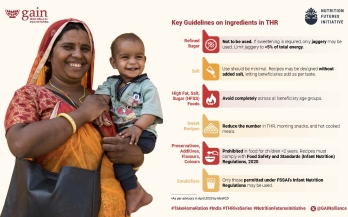
THRive Together: Advancing Nutrition Resilience Through Community Delivery Systems
The Take-Home Ration (THR) component of India’s Supplementary Nutrition Programme, the world’s largest flagship supplementary feeding programme under POSHAN 2.0 and Saksham Anganwadi, is a key intervention to improve the nutrition of children 6-36 months, adolescent girls, pregnant women, lactating mothers. THR has evolved over the years to ensure it provides adequate amount of daily and protein for children and PWLMs, with recent updates emphasizing macro- and micronutrient profiles and limiting added sugars, salt, preservatives, and synthetic additives.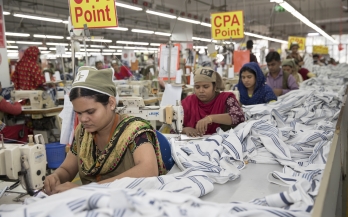
Bangladesh Sets the Pace: Government Champions Workforce Nutrition
Every day, millions of workers in Bangladesh’s bustling garment factories often face challenges in accessing safe and nutritious food due to long working hours and affordability constraints. Bridging this gap, the Global Alliance for Improved Nutrition (GAIN) pioneered the implementation of workforce nutrition programme - Strengthening Workers Access to Pertinent Nutrition Opportunities (SWAPNO) since 2015. What began as canteen improvements, Fair Price Shops (FPS), and targeted micronutrient supplementation efforts in a handful of factories have now snowballed into a full-fledged national movement.